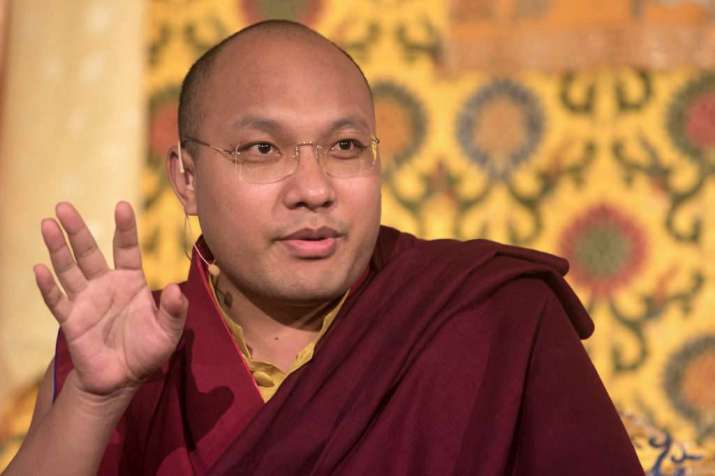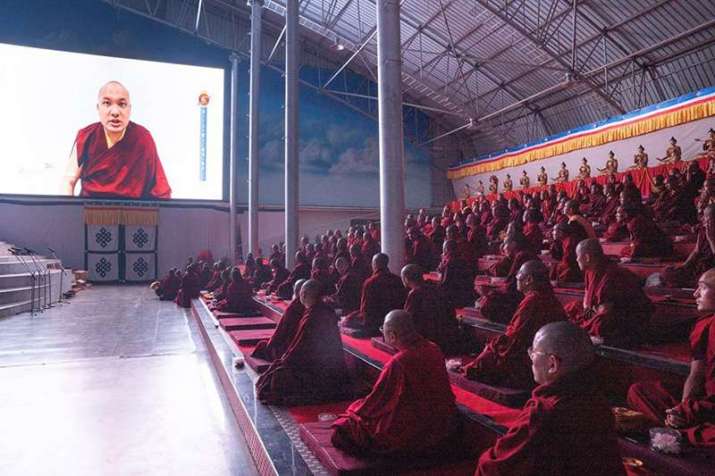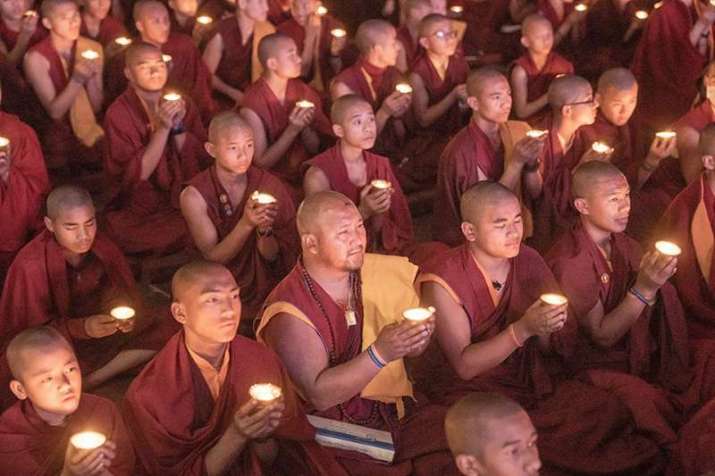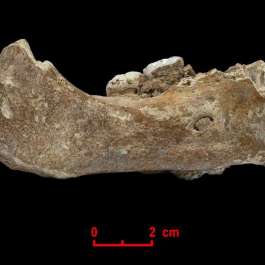
His Holiness the Karmapa, Ogyen Trinley Dorje, recently spoke in public for the first time about ongoing talks with the government of India over his residency status in the country. The Tibetan spiritual leader said on Monday that he applied for a visa to return to India in October last year, but is still waiting for a response from the authorities.
“As all of you know, I have a new passport [from the Commonwealth of Dominica]. Once I got the new one, my old document, the IC [Identity Certificate], became invalidated,” the Karmapa said via webcast during his special address on the last day of the 36th Kagyu Monlam, which ran from 9–21 January in Bodh Gaya, India. “As soon as I got the new document, I went to the Indian embassy in New York [in October 2018] to turn in to them. I went there and told them I needed to turn in the old travel document and further requested them to grant me a visa on my new passport.” (YouTube)
The Karmapa explained that he had been met with a wall of red tape in his dealings with embassy officials to secure a visa for his return to India: “. . . the people in that office said that they were not authorized to do so and needed to ask the offices in Delhi about it. There was a lot of back and forth, which took a bit of time, and in the end I could not get these things done.” (YouTube)
The Karmapa, a vocal advocate for female monasticism, and environmental awareness and sustainability, is believed to have been residing in the United States since 2017. He originally traveled to the US to visit his ailing 80-year-old senior attendant Gelek Kunchok, who had been hospitalized in New York. Shortly afterwards, His Holiness announced that he was extending his stay after a general health check revealed some causes for concern.* In August last year, the Karmapa announced his intention to return to India later in the year, saying, “I have no doubt or question that my return to India is absolutely certain,” and noting that he had been discussing his return with the Indian government.**
Ogyen Trinley Dorje was born in 1985 in Lhatok, in the traditional region of Kham in eastern Tibet, and received his initial education at Tsurphu Monastery, the traditional seat of the Karmapa lineage. On 28 December 1999, at the age of 14, he fled to India after months of careful planning, traveling by car, on foot, on horseback, by helicopter, train, and taxi, eventually arriving in Dharamsala on 5 January 2000, where he was received by His Holiness the Dalai Lama.
Since his arrival on Indian soil, the movements of the Karmapa, who until recently was based at Gyuto Monastery in the town of Sidhbari in Dharamsala, have been closely monitored by the Indian government. In 2000, a state security committee passed an order restricting the Karmapa from traveling to sensitive parts of the country without prior permission, including Rumtek Monastery in Sikkim, built by the 12th Karmapa in the mid-1700s and a focal point for sectarian tensions within the Karma Kagyu school of Tibetan Buddhism. In 2015, the government decided to review the order on travel restrictions, which were eased with the exception of Rumtek Monastery.
The Kagyu Monlam is an annual event held in Bodh Gaya attended by hundreds of monastics and lay disciples from the four schools of Tibetan Buddhism, including many senior lamas. It is considered one of the most significant events in the Tibetan Buddhist calendar.
“In terms of Dharma, the Kagyu Monlam is one of the most important events of our year, and now twice I have not been able to come. This is quite noteworthy, therefore I want to take this opportunity to apologize to all of you,” His Holiness said during his 35-minute address. “During November of last year here was a great meeting planned for the end of that month in Dharamsala for which all the leaders of the various lineages were insistently called to attend. I had [a] great wish to attend. But before this in October, I thought that . . . I would quickly travel to India. I wanted to meet His Holiness the Dalai Lama as I hadn’t seen him for a long time. I also wanted to meet and talk with some people of the Indian government.” (YouTube)

“I was thinking that I must attend this meeting of the heads of the lineages in November. In the end, this meeting was postponed*** due to the passing of the head of the Nyingma lineage Kathok Getse Rinpoche,”**** the Karmapa explained. “All this work around the passport was not getting cleared up, so I thought to set this work aside. . . . Up to this point I have not been able to return, but we continue our conversations with the Indian government. I hope to return to India just as quickly as I can to see you all.” (YouTube)
According to sources cited in a report today by The Indian Express newspaper, New Delhi was allegedly upset that the Karmapa had not shared information about his new passport, and the issue had been flagged by India’s intelligence community, which has previously indicated that it suspects the lama of being a Chinese spy.
Since the turn of the century, Buddhism has emerged as a major strategic tool in the “soft diplomacy” efforts of Asia’s emerging economic behemoths China and India. The governments of both countries have been active in promoting their respective Buddhist histories, jockeying to positions themselves as cradles of Buddhist thought and culture in order to bolster their political power with the weight and reach of Buddhism’s cultural and spiritual influence, both domestically and internationally.
In addition to diplomatic ties with China, India also needs to consider the implications with regard to the broader Tibetan diaspora. It is widely believed that the 33-year-old Karmapa could eventually succeed His Holiness the Dalai Lama, now 83, as the principal figurehead of Tibetan Buddhism and, by extension, Tibetan communities around the world. Political commentators have speculated that New Delhi may soften its stance toward the Karmapa in the hope of benefiting from his influence in the global Buddhist community.

The Karmapa is the head of the Karma Kagyu, the largest lineage of the Kagyu, one of the four major schools of Tibetan Buddhism—the others being Gelug, Nyingma, and Sakya. The institution of the Karmapa is the oldest tulku lineage in Tibetan Buddhism, dating back to the first Gyalwa Karmapa, Düsum Khyenpa (1110–93), predating the Dalai Lama lineage by more than two centuries. Due to a disagreement within the Karma Kagyu school over the incarnation recognition process, the identity of the 17th Karmapa has been a matter of some dispute. The majority of Tibetan Buddhists recognize Ogyen Trinley Dorje as the reincarnation of the 16th Karmapa Rangjung Rigpe Dorje, while an influential minority recognizes Trinley Thaye Dorje.
* Karmapa Extends Stay in US, Health Concerns Cited (Buddhistdoor Global)
** His Holiness the Karmapa Shares Plans to Return to India (Buddhistdoor Global)
*** High-level Summit of Tibetan Buddhist Leaders in India Postponed Indefinitely (Buddhistdoor Global)
**** His Holiness Kathok Getse Rinpoche, Seventh Head of the Nyingma School, Passes Away in Nepal (Buddhistdoor Global)
See more
Gyalwang Karmapa’s Address to the 36th Kagyu Monlam (YouTube)
Kagyu Monlam
Karmapa Ogyen breaks silence, says applied for visa in October but yet to hear from India (The Indian Express)
Karmapa acquires a Dominica passport, loses New Delhi’s trust (The Indian Express)












